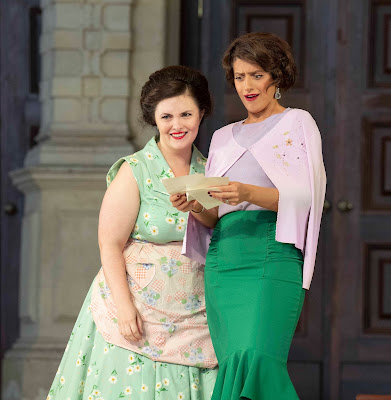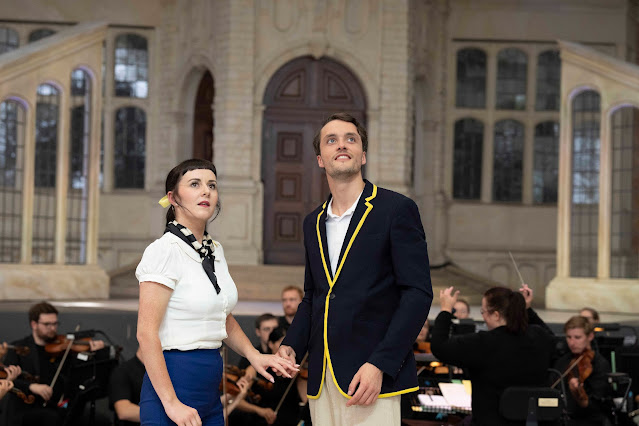 |
| Vaughan Williams: Sir John in Love - Nancy Holt, Alexandria Moon, Jacob Bettinelli, Jack Holton & ensemble - British Youth Opera (Photo Alastair Muir) |
Ralph Vaughan Williams: Sir John in Love; director Harry Fehr, Southbank Sinfonia, conductor Marit Strindlund; British Youth Opera at Opera Holland Park
Reviewed 24 August 2022
RVW's Shakespearean opera gets an anniversary staging in a engaging performance bringing out the work's lovely sense of warmth and humanity
Vaughan Williams' 150th anniversary has not brought out productions of his operas at major UK opera companies, despite both ENO and Covent Garden having performed RVW's operas within the last 20 years or so. So, it is very heartening that British Youth Opera (celebrating its own 35th anniversary) chose RVW's Sir John in Love for its Summer production this year.
 |
| Vaughan Williams: Sir John in Love - Johannes Moore British Youth Opera (Photo Alastair Muir) |
Sir John in Love has a rather patchy performance history, written in 1928 it was premiered by the Royal College of Music in 1929, it had to wait until 1948 for a professional production. Sadler's Wells Opera performed it in 1958, and then it had to wait until 2006 for another professional outing in the UK, when ENO presented its production. The work has always had rather more student than professional productions. Partly, this is RVW's own fault, the work has a whopping 20 named singing roles which is double the cast of Verdi's Falstaff.
British Youth Opera's production of RVW's Sir John in Love opened at Opera Holland Park on 24 August 2022. The production was directed by Harry Fehr, with Marit Strindlund (herself a BYO alumna) directing the Southbank Sinfonia, designs were by Nate Gibson and lighting by Chuma Emembolu.
We saw the first of two casts (and admirably there was a cover cast too), with Johannes Moore as Falstaff, Armand Rabot as Pistol, Phillip Costovski as Bardolph, Grace Marie Wyatt as Anne Page, Eva Gheorghiu as Mistress Page, Jack Holton as Page, Lexie Moon as Mistress Ford, Jacob Bettinelli as Ford, Nancy Holt as Mistress Quickly, Steven van der Linden as Fenton, Joshua Saunders as Shallow, James Micklethwaite as Slender, Matthew Bawden as Simple, Justin Jacobs as Dr Caius, Emyr Jones as Sir Hugh Evans, Toki Hamano as Nym, Edward Kim as Rugby, Patrick Owston as the Host of the Garter Inn.
RVW's own libretto stays far closer to the play than does that of Boito for Verdi, though RVW introduces other poets to provide arias and ensembles, pause points in the mad gambol of plot. He also uses a large amount of folk-song, deliberately so, and whilst the orchestral accompaniment incorporates folk tunes, a lot of the folk material is diegetic; RVW's creates opportunities for the characters to sing the songs themselves. The work has no recitative as such, the dialogue flows as a sort of continuous orchestral accompanied arioso, and the orchestra is important as partner as well as accompanist. This can create challenges for a younger cast, there is a lot going on in the orchestra, but there are rich musical rewards. And the moments when things pause, when RVW introduced extra material are often completely magical.
Fehr and Gibson took advantage of Opera Holland Park's wide stage to present the three sets for all scenes in the first two acts, with the Ford's house at the centre. Scene changes (which are accompanied by orchestral interludes in the score) were effected by the entire cast moving the props so that the centre of the stage was always the scene being played out, but the other two might still have background action going on, thus giving us an idea of the continuing life of Windsor town.
 |
| Vaughan Williams: Sir John in Love - Eva Gheorghiu, Lexie Moon British Youth Opera (Photo Alastair Muir) |
The work took some time to settle and make its mark; there is a lot of plot and dialogue to get through in the first half. But Fehr neatly established the different characters and the work drew us.
It helped that the second half was more of a sequence of set pieces, all set in motion by events in the first half, with the fight between Dr Caius and Huw Evans, the non-discovery of Falstaff in flagrante at the Fords and of course the long scene in Windsor Forest. Each of these was imaginatively shaped (and reshaped) by RVW's music. The production was amusing rather than funny, Fehr and RVW brought out the humanity in the characters and the final scenes did, indeed, form a fine emotional climax to the work. This isn't Verdi, and RVW didn't want it to be, he was interested in other aspects of the piece.
Fehr's attention to detail meant that we had a lovely feel for the sheer busy-ness of Windsor, including the moment when the chorus and cast streamed across the stage in search of Falstaff in his assignation with Mistress Ford. An imaginative use of the fore-stage brought plenty of more intimate moments, for Grace Marie Wyatt 's Anne Page and Steven van der Linden's Fenton of course, but also for Johannes Moore's Falstaff when we got a more thoughtful love-struck aspect to the character. But most notably when Falstaff was marooned on the fore-stage during the appearance of the 'fairies' in Windsor Forest.
Despite being half the age and a third of the weight of the character he was playing, Johannes Moore made a fine Falstaff, giving the character a sense of solidity and swagger, yet making him somewhat less objectionable than usual. Moore brought an element of charm to the role, making you realise how Falstaff gets away with it, as well as giving the character sufficient dignity alongside his more boorish elements.
Grace Marie Wyatt made a poised Anne Page with Steven van der Linden as her engagingly earnest beau Fenton, both had lovely lyric voices and Wyatt has a lovely way of drawing focus to herself even when still and not singing. Eva Gheorghiu and Lexie Moon had great fun as the pair of merry wives, full of wit and character, nicely contrasted in voice and style, aided by the charmingly managerial wit of Nancy Holt as Mistress Quickly, less of a harridan than usual and all the better for it. As the husbands, Jack Holton was a finely upright Ford with Jacob Bettinelli as an intense and obsessive Page, whose apology scene to his wife was very finely done indeed.
The secondary plots were populated by a fine arrange of strong characters, Justin Jacobs as a blustering Dr Caius, Emyr Jones as the prosy Hugh Evans, Joshua Saunders as the self-righteous Shallow with James Micklethwaite as the idiotic Slender, all the time mooning over Anne Page. Falstaff's hangers on were neatly taken by Phillip Costovski, Armand Rabot and Toki Hamano, with Patrick Owston as the ubiquitous host of the Garter Inn. The servants completed the cast, Matthew Bawden as Simple, Edward Kim as Rugby, Eoin Foran and Ross Fettes as the Ford's gardeners.
The cast worked hard to overcome the limitations of age and the drawbacks of playing in this theatre. There was no acting old, the youth of the cast was never in question, but many of them brought a fine sense of maturity and being grounded to their performances, convincing as a series of more mature characters. Words were at something of a premium, but it was clear that they were trying hard, and the moments when Fehr brought his characters onto the fore-stage really told.
The second half of the opera develops into a real ensemble piece and the chorus, hitherto largely used as supers and to move scenery, came into its own, singing finely and becoming and engaging part of the production.
The orchestra was in fine form, and this is one of RVW's loveliest and most melodious scores. Marit Strindlund drew a finely flowing account from the Southbank Sinfonia and everyone seemed to relish the sound-world. Too much so, at times, and there were moments when I think Stridlund could have usefully kept the orchestra down.
 |
| Vaughan Williams: Sir John in Love - Grace Marie Wyatt, Steven van der Linden - British Youth Opera (Photo Alastair Muir) |
Sir John in Love is never going to be a repertoire piece, but this production gave us a reminder of quite what a engagingly melodious and profoundly human piece it is. There was a lovely sense of warmth and humanity from the production, with very little guying of the characters and the folk music giving that particular atmosphere. A large number of young artists were involved in this production, not just the singers and the orchestra but all the backstage crew as well. A terrific way of celebrating BYO's 35 anniversary, with around 45 singers, 16 backstage crew and 35 instrumentalists all involved in a large-scale production.
RVW always had a high regard for students and the importance of training, not only was the premiere of Sir John in Love given by the Royal College of Music, but he always regarded the 1954 Cambridge University production of The Pilgrim's Progress to be far superior than the Covent Garden premiere in 1951.
Never miss out on future posts by following us
The blog is free, but I'd be delighted if you were to show your appreciation by buying me a coffee.
Elsewhere on this blog
- The songs of William Busch: revealing the quietly distinctive voice of an underexplored composer - record review
- The curious case of Alan Bush's operas: enormously popular in East Germany in his lifetime, they remain unperformed and unexplored now - feature
- Crossing boundaries between contemporary classical, experimental electronic, ambient and electroacoustic - Matthew Whiteside's Remixes - record review
- Spirit and abandon: Ethel Smyth's Mass at the BBC Proms returns the work home, to the hall where it premiered in 1891 - concert review
- Prom 43: Handel's Solomon from Sofi Jeannin, BBC Singers, the English Concert & Iestyn Davies - concert review
- Different ways of doing things: Michael Wolters' Aria Cuntata and the Low Miracles from Birmingham Record Company - record review
- Seductive craziness: loosely inspired by Martial and Aristophanes, the opera Xeniae by Latvian composer Juris Abols is a polystylistic extravaganza - record review
- Florian Klaus Rumpf takes us on A Mandolin's Guide to Hamburg - record review
- Prom 39: a Turnage premiere, a Vaughan Williams rarity and an Elgar Symphony - concert review
- Ethel Smyth in lighter mode: The Boatswain's Mate returns to the Grimeborn Festival - opera review
- Embrace: Swiss baritone Äneas Humm draws you into his imaginative look at the edges of the 19th and 20th century lieder tradition - record review
- Matters of the heart: a warmly communicative journey through Schumann's Frauenliebe und -leben with Sarah Brady and Stephen Delaney - record review
- Home

.jpg)









No comments:
Post a Comment